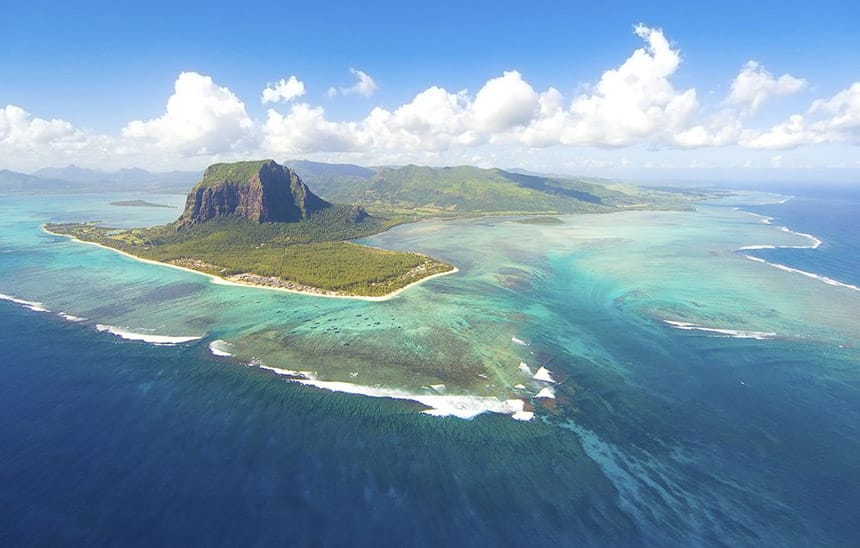
simply amazing, always for you.
Nestled in the turquoise waters of the Indian Ocean, Mauritius is a tropical paradise that captivates travelers with its pristine beaches, diverse culture, and lush landscapes. Beyond its picturesque scenery and vibrant traditions, Mauritius is also remarkable for a unique characteristic—it is one of the few countries in the world with no standing army. This exceptional feature reflects the nation’s commitment to peace, stability, and harmony, making it a fascinating study in governance and development.

Geography and Early History
Mauritius is a small island nation located about 2,000 kilometers off the southeastern coast of Africa. The main island, Mauritius, is accompanied by several smaller islands, including Rodrigues, Agalega, and the Cargados Carajos Shoals. Together, they form a total land area of just 2,040 square kilometers, making Mauritius one of the smallest countries in the world.
The island was uninhabited until it was first discovered by Arab sailors in the 10th century. Later, it became a significant stopover for European explorers. The Portuguese were the first Europeans to land on the island in 1507, followed by the Dutch in the late 16th century, who named it after Prince Maurice of Nassau. The French took control in 1715, naming it “Île de France,” before ceding it to the British in 1810 during the Napoleonic Wars. Mauritius gained independence from Britain in 1968 and became a republic within the Commonwealth in 1992.
A Country Without an Army
Since its independence, Mauritius has maintained a unique status as a country without a standing army. The decision to forgo a military was not born of necessity but rather a deliberate choice to prioritize peace and allocate resources toward development. Instead of a military, the country relies on its paramilitary police force, the Special Mobile Force (SMF), and the National Coast Guard for internal security and disaster response.
This absence of a standing army has significant implications. Mauritius has avoided the pitfalls of military coups and the diversion of resources into defense spending, a common challenge in many developing countries. By channeling funds into education, healthcare, and infrastructure, Mauritius has achieved impressive social and economic progress.
Peaceful Governance and International Relations
Mauritius’s commitment to peace extends beyond its borders. The nation has been an active member of international organizations, including the United Nations (UN), the African Union (AU), and the Commonwealth of Nations. It adheres to a foreign policy rooted in diplomacy and multilateralism, emphasizing cooperation and conflict resolution.
The country has successfully maintained friendly relations with its neighbors, including Madagascar, Seychelles, and the African mainland. While disputes have occasionally arisen, such as the ongoing sovereignty issue over the Chagos Archipelago with the United Kingdom, Mauritius has consistently pursued peaceful negotiations and legal channels to assert its claims.
Economic Success in the Absence of Militarization
One of the most compelling aspects of Mauritius’s success is its economic transformation. At the time of independence, Mauritius faced significant challenges, including a monocrop economy reliant on sugar, high unemployment, and limited infrastructure. Despite these obstacles, the country has emerged as one of Africa’s most prosperous nations.
Key to this success has been its diversification into sectors such as tourism, textiles, information and communication technology (ICT), and financial services. Mauritius’s political stability and prudent economic policies have attracted foreign investment, while its highly educated workforce has fueled innovation and productivity.

Tourism, in particular, has flourished, with millions of visitors drawn to the island’s white sandy beaches, coral reefs, and luxury resorts. The government has also positioned Mauritius as a financial hub, taking advantage of its strategic location between Africa and Asia to attract global business.
A Multicultural Mosaic
The peaceful nature of Mauritius is mirrored in its diverse and harmonious society. The country is a melting pot of cultures, ethnicities, and religions, with influences from Africa, India, China, and Europe. This diversity is a result of its history as a colonial trading hub and its reliance on indentured labor during the British colonial period.
Hindus, Muslims, Christians, and Buddhists coexist peacefully, celebrating each other’s festivals and contributing to a vibrant cultural tapestry. National holidays like Diwali, Eid, Christmas, and Chinese New Year are celebrated with equal fervor, fostering unity in diversity.
Challenges and the Path Forward
While Mauritius’s lack of a military has been a cornerstone of its stability, the country faces challenges that require vigilance. Climate change poses a significant threat, with rising sea levels endangering its coastal areas and biodiversity. Additionally, the COVID-19 pandemic exposed vulnerabilities in the tourism-dependent economy, underscoring the need for greater resilience and diversification.
Maintaining internal security is another ongoing concern. While the paramilitary police force is well-trained, Mauritius must ensure that its security forces remain apolitical and focused on protecting the public. Investment in cybersecurity and maritime security is also essential, given the increasing global reliance on digital infrastructure and the strategic importance of the Indian Ocean.
A Model for Peace
Mauritius serves as a compelling example of how a nation can thrive without a standing army. Its commitment to peace, combined with prudent governance and an emphasis on human development, has enabled it to achieve remarkable progress in a short span of time. While challenges remain, the country’s peaceful ethos and resilience offer valuable lessons for the world.
As global conflicts persist, Mauritius stands as a reminder that peace is not just the absence of war but a deliberate choice to prioritize harmony, inclusivity, and development. It is this choice that makes Mauritius not only a paradise for tourists but also a beacon of hope for those seeking a better way forward in a turbulent world.

Support Our Website!
We appreciate your visit and hope you find our content valuable. If you’d like to support us further, please consider contributing through the TILL NUMBER: 9549825. Your support helps us keep delivering great content!
Thank you for your generosity!
